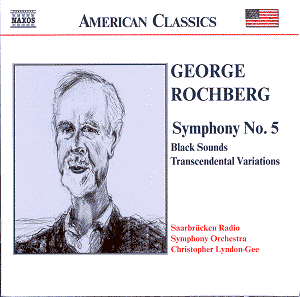This is a useful introduction to the work of
the living American composer George Rochberg, whose name only
previously meant much to me for a Violin Concerto recorded
by Isaac Stern with the Pittsburgh Symphony under Previn. It is
made more desirable by the fact that two of the works are given
their first recordings here, and in some style by Christopher
Lyndon-Gee, whose previous Naxos disc was a superb Varèse
anthology. Fittingly, this one includes Black Sounds, written
in 1965 as a homage to the great French-American iconoclast.
The Symphony is the most recent work and
consists of a single movement of seven distinct but connected
sections. The Opening Statement gets the work off to a
breakneck start and is very filmic in its evocations, not a million
miles in some ways from the aforementioned Varèse. The
music then alternates between more subdued Episodes, three
in all, and again more rhythmic, driven Developments. The
horn music in the second Episode is rightly singled out
by the conductor's booklet notes as being "hauntingly beautiful"
- echoes of Mahler and even Wagner are heard here. The third episode
is almost Feldmanesque in its muted, slow bell-like tones, contrasting
completely with the urgent, insistent Finale, although
even here a sense of uneasy peace is restored temporarily by a
poetic, elegiac and very long cello solo. "The power and sweep"
of the piece as a whole are self evident, but we are a very long
way from American symphonies such as the open air Harris 3rd
which is often described with similar language. It is not surprising
that a German orchestra was used for the recording because Rochberg's
muse is probably as close as you can get, within the 20th
century American canon, to the Central-European tradition.
Black Sounds, perhaps contrary to expectations
of some jazz inflected workout, is based on a piece for wind ensemble
and percussion, Apocalyptica, which was prefaced by some
elemental lines from King Lear. It was commissioned for
and first performed as a ballet called The Act, about,
surprise, surprise, an act of murder, so you probably get the
general gist of the piece. Again the word "filmic" springs to
mind, as belching brass and hyperactive percussion drive the music
forward before some quieter but still insistent passages make
an appearance. I suppose the dedication to Varèse is apt,
with the music lying somewhere between Stravinsky and Birtwistle!
Stimulating listening but tunes are at a premium!
In contrast, Transcendental Variations,
a reworking for string orchestra of the slow movement of Rochberg's
3rd String Quartet, is a much smoother, more
tonal listening experience, showing how far the composer had moved
in the ten years since Black Sounds. The seven variations
find the composer at his most Mahlerian with a full, romantic
sound imbued with a resigned melancholy. Lovers of the Strauss
of Metamorphosen and the Wagner of the Siegfried Idyll
will surely also find much to entice them here, particularly in
the valedictory final variation. The transcendental of
the title is in the sense of time and also, I feel, the transience
of human experience. Although rather more richly orchestrated
than is usual to this listener's taste there is no denying the
sheer beauty and emotion at work. If you thought Barber's Adagio
was unique piece as far as American music goes then think again!
Neil Horner
